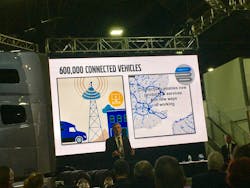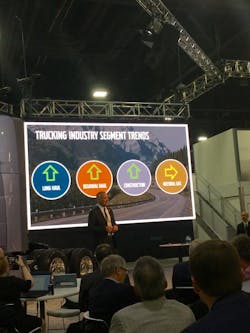Volvo sees connectivity, electricity, automation shaping trucking's future
ATLANTA. Volvo Trucks said it is having a strong year, with several updates to its truck lineup and the recent opening of a new customer center.
However, much of the focus at its Sept. 25 media event at the North American Commercial Vehicle show was not about the present, but what is to come.
“The future is coming faster than we all expect,” said Goran Nyberg, president of Volvo Trucks.
The growth of connectivity, electro-mobility, and automation will all have a “dramatic influence” on transportation, said Keith Brandis, Volvo’s director of product planning.
Brandis said Volvo is obtaining data on 600,000 connected vehicles across its global brands in the ongoing effort to increase the uptime of all its vehicles. By leveraging connectivity, fleets are now able to tailor vehicle parameters to different types of hauls or terrains.
“We are just now at the beginning of this very exciting area,” Brandis said. “Being connected is the key enabler.”
Nyberg compared the latest developments in truck connectivity with the smart phone, noting that no one would purchase a particular phone if it needed to be brought into a store each time there was a recommended software update.
On a separate topic, Brandis said that while “diesel is still a very energy efficient fuel,” there is no question that electric powertrain systems will continue to rapidly develop.
Electric trucks will generally be aimed for city deliveries, although there will be more experiments in regional haul. Brandis said. That will be especially attractive in areas of the world where fuel is up to three times more expensive than the United States.
While Brandis cautioned a lack of electric infrastructure is one of the challenges that need to be resolved, Nyberg declared “electrification is coming.”
Automation is also advancing, as Volvo and other manufacturers develop systems aimed at assisting the truck driver to be safer and more productive.
With platooning and autonomous driving, there are “challenges we as engineers admit we have not figured out,” Brandis said.
But significant strides in these areas are being made, such as Volvo’s involvement in a recent truck platooning demonstration in Virginia.
The Volvo officials called for federal oversight to promote further progress in this area, a step needed to avoid a piecemeal of state regulations. That sentiment was recently shared by other trucking industry officials during a Senate hearing.
About the Author
Neil Abt
Neil Abt is a former FleetOwner editor who wrote for the publication from 2017 to 2020. He was editorial director from 2018 to 2020.

